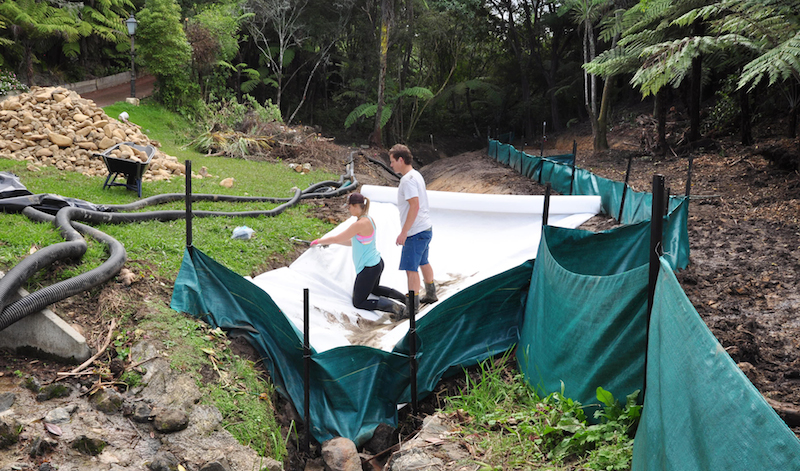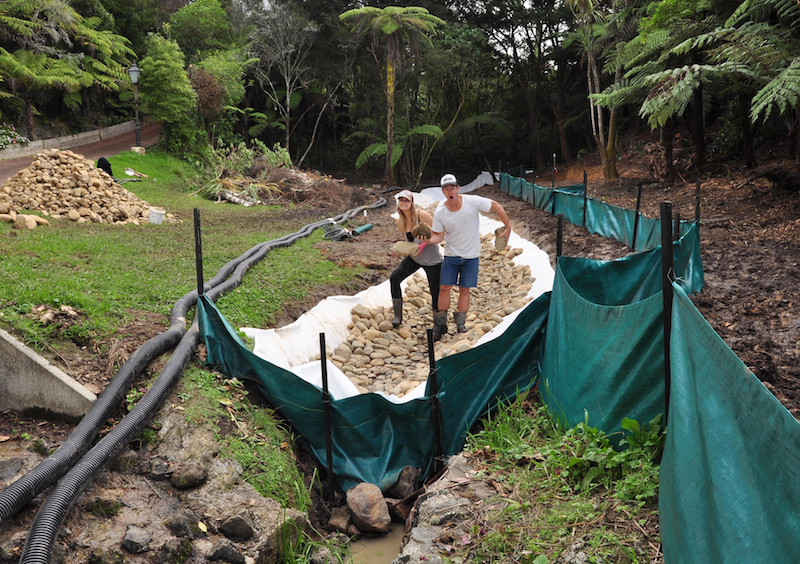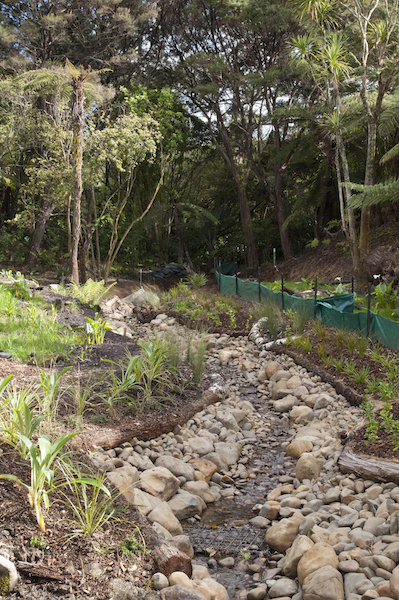The stream is like our little baby. We love it and have been spending hours and hours and hours in it, on it and around it as we try to make it look as natural as possible as soon as possible.
To cut a long planning and approvals process short, we worked with Lance Millward from Verdant Green to design a riparian planting and remediation plan as part of our Resource Consent. He was awesome and the Council loved our final plan.
So over the past weeks. Well many, many weeks. We’ve been implementing that plan.
That started with lining the whole channel with a white geo-textile fabric to prevent erosion. Which was easier said than done when it came to pushing plastic ground pins through the neigh on inpenitrable fabric! But thanks to Kylie and her Mum, their perseverance paid off and it was finally laid down.
Then we laid rocks over the top of that to form a hardy channel and armour the banks. We wanted natural looking rocks vs quarry blasted rip rap so we were stoked to discover Mangatangi River Rocks down near Thames and their beautiful autumnal river rocks.
I got 10 tonnes delivered by truck, then Kylie’s parents, her brother and his girlfriend helped us move every single rock by hand. Thanks guys!
Then in between a lot of help from Lance as he pinned logs to the banks to form stable planting areas, placed large feature rocks and dug gabion baskets into the channel, we’ve been pottering away making everything as perfect as it can be. Which has included many more trips out to the quarry to get more rocks by the trailer load. And by my rough calculations we brought back another 10 tonnes at least.
A couple of months later and we’re stoked with how it’s all coming together. It looks so natural already and the plants haven’t even grown. The stream is justifiably grand to be the central feature of our house and we couldn’t be happier.
In fact, like proud parents, we’ll pop in almost every day to see our wee baby. And I’m pretty sure when we’ve moved in, you’ll be able to see me sitting on the glass bridge for hours just watching the water trickle by.
Here’s a wee time lapse I started, then the batteries ran out!






Ben/Kylie;
I have been following your build and it is exciting. One quick comment. Our home is clad in clear (knot-free) resawn Western Red Cedar, in 1/2 inch by 4 inch boards up to 20 feet in length over exterior grade Douglas Fir plywood sheathing and shielding paper. The house was built about 50 years ago, and the original siding remains in excellent condition because it has been carefully cared for over the years. Regarding that, the most important thing is to be aware of and obsessively eliminate surface mold and mildew regularly and FOR SURE before periodically recoating the boards with oil or water-based stain.
Our home sits directly on absolute waterfront on a 25 hectare island in the Pacific Northwest USA (San Juan Islands, north of Seattle). The decks actually overhang the high tide line on a rocky shoreline. We stain our siding every couple of years, and are very careful about treating mold and mildew in the interim and when applying a new coat of stain to the cedar. We have used various products over the 30 years we have owned the house, but have always addressed the mold/mildew issue, so essentially we have none on the cedar even after all this time. Molds/mildews vary with region, so you will need to use a treatment suited to your area.
FWIW, we are familiar with New Zealand and your weather conditions. We have been visiting NZ since 1987, and over the past decade or so have spent 6 to 10 weeks there each year (our winter is your summer). We have seen virtually everything from Cape Reinga to Dunedin, and now spend most of our time in Taupo and Ohope Beach. We were on the Coromandel a couple times this year at a friends bach that looks across the water toward your location, so we know the weather in your area pretty well. We get about half as much rain here annually as Auckland (less than one half a meter), but Seattle gets about the same as your region – so we know what a moderate, often damp, climate is like.
There are many varieties of cedar, including several known to be highly weather, disease, and rot resistant. It is a great exterior material, but it requires constant care if it is to last and look good over time. I don’t know what type of cedar you will be using, but Western Red Cedar (native to the Pacific Northwest) is an extremely good variety. The only exterior wood I would prefer is California Coastal Redwood, but it is hard to get (even here) and exceedingly expensive these days.
One word of caution – an oil finish tends to be susceptible to mold/mildew and associated discoloring. The first hint will be the formation of small, subtle, dark blotches. Attack them like the plague before they spread. We have used both oil and water based-stain over the years and now use water-based exclusively. It is easier to work with and seems to penetrate the wood better, especially over many years. We apply only one coat at a time, so it penetrates the wood siding and doesn’t build up on the surface and start looking shiny.
Good luck with your project. I love what you have done with the stream. It too will require a lot of care over the years, but will return the love with many hours of serenity.
Cheers;
Hector Cyre
Brown Island
Washington State, USA
Hi Hector
Thank you for your awesome comment and for following our build from all the way over in Washington State! Wow, your house sounds epic. I’d love to see some photos!
Great to hear that even in such a marine environment, with some regular maintenance you can keep the natural cedar look for 50+ years!
We are using Western Red Cedar too, and it’s the best around. Getting it from a great company called Rosenfeld Kidson here in Auckland. http://www.cedarscreen.co.nz
They advised us on best practice maintenance which involved a yearly soft wash with water in between coats of oil every 5 years. How do you go about removing mould etc when you spot it? Any secrets?
Maybe next time you are out in NZ and we have finished our house, we can show you around! Bond over our mutual love of cedar and all that…seriously!!
What you have done with the stream is outstanding. A testament to hard work. Well done.
Will look forward to seeing progress as you place the house on the site. Are you still able to site your carport under the living on the south side?
By the way, have a look at a product called Timberkote for your cedar. It’s a translucent acrylic paint, so you can see the wood grain as well as have the benefit of protecting and colouring it. Very easy to apply also!
Thanks Greg, appreciate that! We’re pretty stoked with how it’s come up, that’s for sure. Yep, our cars will be parked below the living area. It’s a large cantilevered section overhead, so should look pretty cool once built.
Thanks also for the info on Timberkote. We’re actually using Dryden WoodOil as specified by our cedar supplier, Rosenfeld Kidson. It too maintains the grain, while adding colour and of course protection!